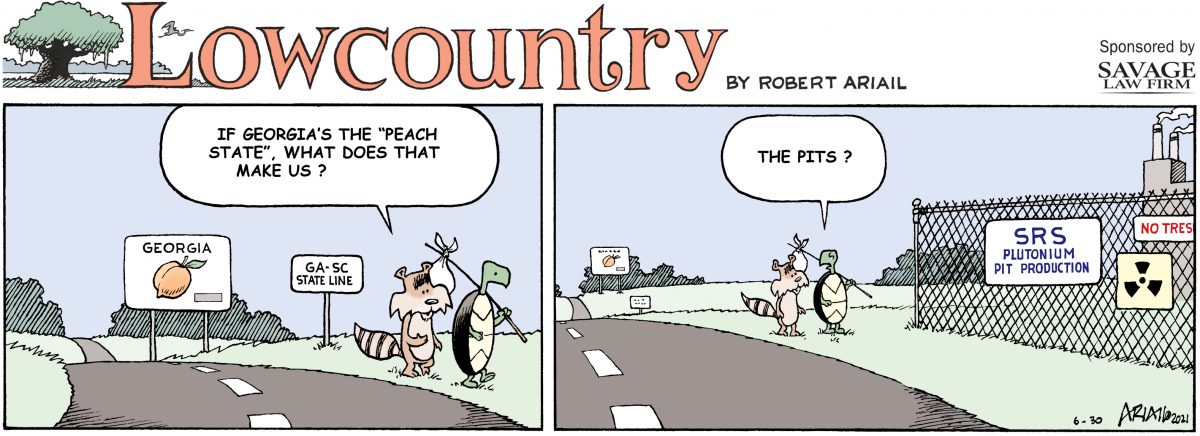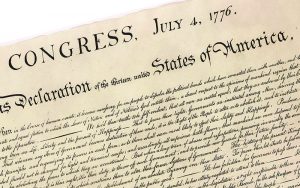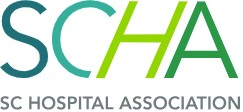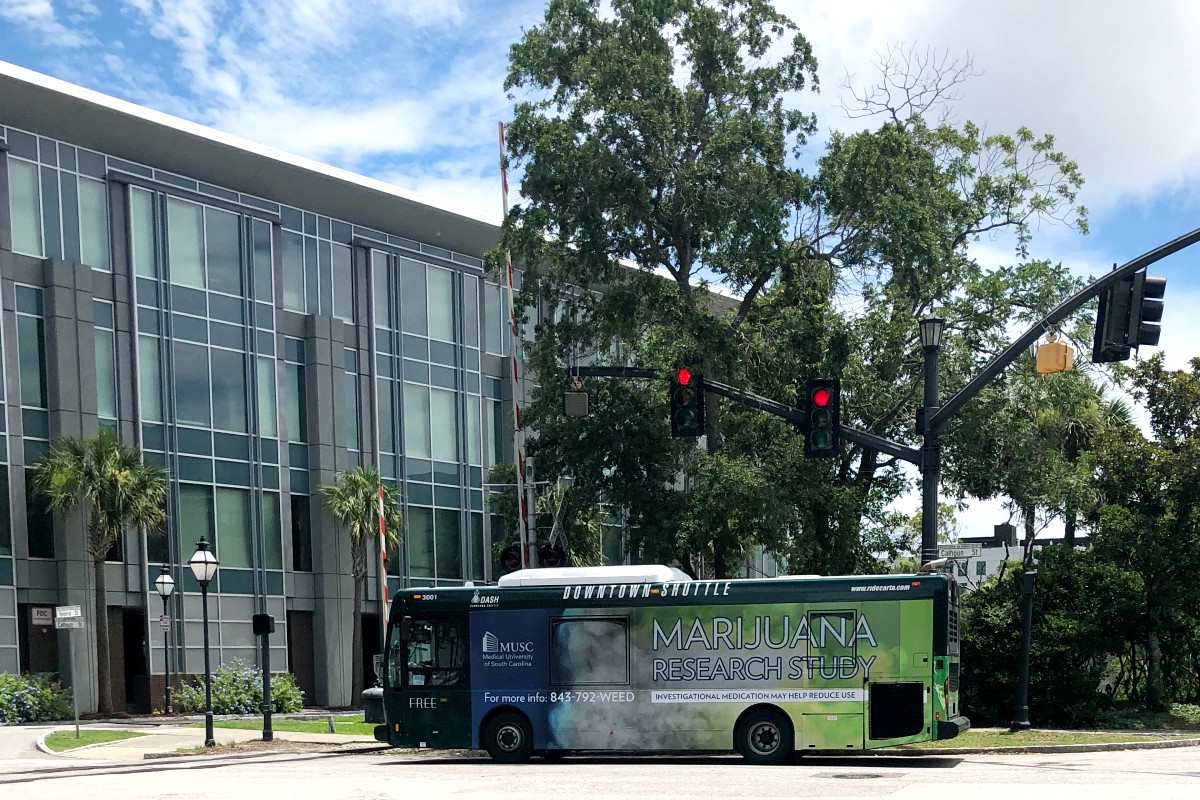STATEHOUSE REPORT | ISSUE 20.27 | JULY 2, 2021
BIG STORY: Lawmakers plan to revise state charter school law
LOWCOUNTRY, Ariail: The pits
COMMENTARY, Brack: Weekend challenge: Read the Declaration of Independence
SPOTLIGHT: S.C. Hospital Association
FEEDBACK: Send us your thoughts, but also provide contact info
MYSTERY PHOTO: Different kind of mystery
Lawmakers plan to revise state charter school law

By Andy Brack, editor and publisher | Look for a bipartisan coalition of state lawmakers next year to make a bold effort to revise the state’s 25-year-old law regulating almost 60 charter schools that dot the state. More than 44,000 S.C. students attend the publicly funded schools that operate independently of county school boards.
“No one has been regulating them since the original regs came out,” said state Rep. Terry Alexander, a Florence Democrat who was a member of a special ad hoc House committee that probed issues at charter schools in 2019. It issued a sweeping report in January 2020 that suggested myriad changes to the law, but the coronavirus pandemic put improvement efforts on hold.
This week, the Legislative Audit Council issued a 92-page audit of the S.C. Public Charter School District, which oversees 33 charter schools. The state’s other authorizer of charter schools, The Charter Institute at Erskine, sponsors 26 charter schools.

“I am not shocked at all about the findings [in the audit],” Alexander said. “We kind of saw that during our ad hoc committee meetings. No real oversight has been given. That’s why this ad hoc committee came into being.”

State Rep. Raye Felder, a York County Republican who co-chaired the ad hoc House committee, said some charter schools excel, while others have challenges — just like with traditional public schools.
“I anticipate changes to charter school legislation that was created over 20 years ago to include provisions not only highlighted in the [House] report but also shared by administration and parents over the course of the special committee that reviewed the charter school legislation,” she told Statehouse Report

Charleston Republican Rep. Lin Bennett echoed her colleagues: “Changes are needed. Not just to address these concerns, but to also bring the law up-to-date. This is something we hope to do over the summer and fall and introduce when we return to session in January.”
Accountability is a big issue
According to the Charter Institute at Erskine, “The core of the charter school model is the belief that public schools should be held accountable for student learning. In exchange for this accountability, school leaders should be given freedom to do whatever it takes to help students achieve and should share what works with the broader public school system so that all students benefit.”
But much more accountability is precisely what’s needed, according to the new audit. In particular, it highlighted “authorizer shopping,” meaning that underperforming charter schools in one charter district might transfer to another overseer district to avoid accountability. According to the audit, that became an issue in 2017 when “four underperforming schools transferred from the [Public Charter School] District to the Charter Institute at Erskine over the objections of the district’s board of trustees.
“This presents a challenge to accountability efforts and overall charter school quality,” this week’s audit said.

Sherry East, president of the S.C. Education Association, said the audit findings made her angry because while public charter schools have a place in the educational mix offered by the state, they need to be held to the same standards as public schools.
“Because there are two authorizers for the charter programs, this allows for inconsistency and a lack of transparency,” she said. “The systemic lack of transparency and accountability in several facets of the report leave much to be desired. To honor, rather than undermine, the commitment of educators and staff, as well as the families served, it is incumbent upon the Public Charter School District to operate with less opacity and a demonstration of integrity, including monitoring charter school boards as required by S.C. Code.”
In August of 2020, the two districts signed a three-year memorandum of understanding to suspend school transfers until 2023. By then, lawmakers say they hope to revise the charter school law to deal with two dozen years of issues.
Clarity, consistency, financial, monitoring and website issues
Other issues identified in the audit include lack of clarity of the law closing underperforming schools, inconsistent accountability measures between schools and apart from industry standard, as well as improper documentation. The audit also said the public charter district needed to better monitor local charter boards.
The audit also highlighted the need for the district to have administrative fee policies and to publicize its administrative costs. It also found several website inadequacies, including lack of all legally required information and annual reports, old employee listings, and problems with board minutes, functionality and design.
The House ad hoc committee’s report included other issues for the revision of the charter school law, including better transparency, improved fiscal management, better communication and coordination between charter schools and the state Education Department and better performance
“The legislature has taken measures to hold traditional school districts and locally elected public school boards accountable,” East said. “The legislature should clarify the role of the Public Charter District, enforce and hold them accountable for current codes and should revisit what may be necessary to ensure that the Public Charter District is held accountable for providing a high-quality education and operating with integrating in the same way a traditional public school would be.”

State Sen. Larry Grooms, R-Berkeley, added that he’s heard criticisms of the Public Charter School District (SCPCD) for years.
“For a while, it seemed that the SCPCD became more interested in nitpicking than in providing positive leadership,” he said today. “The success of Erskine as an authorizer helped highlight some of the deficiencies at the SCPCD. The LAC audit verified some of those deficiencies.
Grooms said more competition due to two new authorizers would drive more improvements.
“With Limestone and Coastal Carolina coming online as additional charter authorizers, there will soon be even more comparative data that can be used to help drive improvement at the SCPCD,” he said. “The growth in charter school enrollment speaks to the success of the charter school movement. Charter authorizers have a responsibility to help their charters be successful and to shut them down when they fail their students.”
- Have a comment? Send to feedback@statehousereport.com
The pits

Cartoonist Robert Ariail always has an interesting take on what’s going on in South Carolina. His weekly “Lowcountry” strip is originally drawn for our sister publication, the Charleston City Paper. Love the cartoon? Hate it? What do you think: feedback@statehousereport.com. Check out the Best of Charleston 2021.
Weekend challenge: Read the Declaration of Independence

By Andy Brack, editor and publisher | Today’s column was going to be about earmarks and pork-barrel spending. Or why the governor decided to go against the legislature and veto a bunch of spending that lawmakers wanted. And how when any South Carolina governor picks a battle with the General Assembly, particularly over how it wants to spend money, the governor generally loses because we live in a legislative state where intransigence and stubbornness continually catapult us to the bottom of lists.
 But you’ve probably heard that kind of blather before.
But you’ve probably heard that kind of blather before.
So instead, consider this: What we really need to be doing this weekend as we celebrate the country’s declaration against tyranny is to find a quiet spot to read and then seriously consider the 1,339 words of our Declaration of Independence.
Better yet: Sit down as a family and read it out loud together.
Just six months ago, a bloodthirsty mob misused and misappropriated the fundamental principles enshrouded in American freedom by trying to rip apart our democracy in favor of the very tyranny which our forefathers fought in the fields of Camden and King’s Mountain, the swamps of the Lowcountry and forts from Ninety Six to Sullivan’s Island.
You may know by heart the opening words of the document penned by Thomas Jefferson and others that espouses the values of “life, liberty and the pursuit of happiness.” You may remember the part that follows and discusses how it’s the people’s right to alter or abolish a government that fails, which is oft-cited by those who threw the destructive tantrum and bludgeoned the Capitol on Jan. 6, 2021.
But they conveniently forget the cautious words that followed. Perhaps they missed that day in civics class. Or maybe they were so hellbent on getting their own way that they were blinded by the wisdom of colonial leaders who first focused not on a violent overthrow of power, but on reason and intellect to devise a new system to create a safe nation where all could pursue happiness:
“Prudence, indeed, will dictate that Governments long established should not be changed for light and transient causes; and accordingly all experience hath shewn, that mankind are more disposed to suffer, while evils are sufferable, than to right themselves by abolishing the forms to which they are accustomed.”
 The Declaration continued by offering a list of abuses by the King of England. As you read of compounding restrictions that denied liberty to colonists, it should dawn on you how our forefathers eventually corrected those abuses with a constitution that created a representative democracy that became the world’s beacon of freedom, a continuing experiment in liberty that changed the course of humankind.
The Declaration continued by offering a list of abuses by the King of England. As you read of compounding restrictions that denied liberty to colonists, it should dawn on you how our forefathers eventually corrected those abuses with a constitution that created a representative democracy that became the world’s beacon of freedom, a continuing experiment in liberty that changed the course of humankind.
Furthermore, the Declaration is remarkable in another way. It frames the patience of colonists who wanted better lives for their families. Compare their years of endurance to get redress of their grievances to the volcanic violence that erupted in the halls of freedom over a few hours in January.
And so in 1776, 56 men from 13 colonies signed the Declaration of Independence. The oldest was Benjamin Franklin, then 70, of Pennsylvania The youngest was Edward Rutledge, 26, of South Carolina.
The document ends like this: “And for the support of this Declaration, with a firm reliance on the protection of divine Providence, we mutually pledge to each other our Lives, our Fortunes and our sacred Honor.”
That’s the difference between what happened back then and this year: One was bound with honor, community, faith, goodwill and justice. The other had none.
Celebrate this Fourth of July with family, friends, burgers, barbecue, hot dogs and honor. And read our Declaration of Independence to marvel about our united states and how they came to be.
- Have a comment? Send to: feedback@statehousereport.com.
S.C. Hospital Association
 The public spiritedness of our underwriters allows us to bring Statehouse Report to you at no cost. This week’s spotlighted underwriter is the South Carolina Hospital Association, the Palmetto State’s foremost advocate on healthcare issues affecting South Carolinians. The mission of SCHA is to support its members in addressing the healthcare needs of South Carolina through advocacy, education, networking and regulatory assistance.
The public spiritedness of our underwriters allows us to bring Statehouse Report to you at no cost. This week’s spotlighted underwriter is the South Carolina Hospital Association, the Palmetto State’s foremost advocate on healthcare issues affecting South Carolinians. The mission of SCHA is to support its members in addressing the healthcare needs of South Carolina through advocacy, education, networking and regulatory assistance.
Founded in 1921, the South Carolina Hospital Association is the leadership organization and principal advocate for the state’s hospitals and health care systems. Based in Columbia, SCHA works with its members to improve access, quality and cost-effectiveness of health care for all South Carolinians. The state’s hospitals and health care systems employ more than 70,000 persons statewide. SCHA’s credo: We are stronger together than apart.
- To learn more about SCHA and its mission, go to: http://www.scha.org.
Send us your thoughts, but also provide contact info
We receive a few comments a week and look forward to publishing. But often we can’t because we can’t verify the identity of the writer.
To be published, you’ve got to provide us with contact information so we can verify your letters. Verified letters to the editor are published weekly. We reserve the right to edit for length and clarity. Comments are limited to 250 words or less. Please include your name and contact information.
- Send your letters or comments to: feedback@statehousereport.com
Different kind of mystery

This week, the mystery isn’t something for you to identify, but something to explain. Marijuana, as you know, is illegal in South Carolina. In fact, it’s one of only five states where the evil weed is fully illegal, according to this site. Just this week, conservative U.S. Supreme Court Justice Clarence Thomas said federal marijuana laws may not be necessary.
While pot is illegal in South Carolina, a huge bus (above) speeds around Charleston’s streets advertising for people to participate in a marijuana study at the Medical University of South Carolina. What do you think about that? Send your guess to feedback@statehousereport.com — and remember to include your name, home city and contact information.
 Last week’s mystery, “A bonafide contraption,” showed a cotton bale press located in Latta in Dillon County. Elizabeth Jones of Columbia easily identified the press: “I worked there as a kid, until my parents moved Upstate and I started picking peaches.”
Last week’s mystery, “A bonafide contraption,” showed a cotton bale press located in Latta in Dillon County. Elizabeth Jones of Columbia easily identified the press: “I worked there as a kid, until my parents moved Upstate and I started picking peaches.”
Congratulations to others who identified the photo: Tom E. Stickler of Pawleys Island; Bill Segars of Hartsville; David Lupo of Mount Pleasant; Allan Peel of San Antonio, Texas; Jay Altman and Vicki Ringer, both of Columbia; George Graf of Palmyra, Va.; Will Bradley of Las Vegas, Nevada; Frank Bouknight of Summerville; Jacie Godfrey of Florence; and David M. Taylor of Darlington. Thanks to Barry Wingard for sending along the photo.
Segars added: “This is a 1789 cotton press located at 1251 Highway 38 outside of Latta in Dillon County. It was originally used and located at Berry’s Crossroads. In 1948, it was moved about 1/2 mile to this location and restored. Ginned cotton was placed in the top of the square box and mulles would then walk around in a circle, turning a screw, compacting the cotton into a square bale for shipment. The two diagonally braces hold the structure up straight.”
- Send us a mystery. If you have a photo that you believe will stump readers, send it along (but make sure to tell us what it is because it may stump us too!) Send to: feedback@statehousereport.com and mark it as a photo submission. Thanks.
ORDER NOW: Copies are in Lowcountry-area bookstores now, but if you can’t swing by, you can order a copy online today.
ABOUT STATEHOUSE REPORT
Statehouse Report, founded in 2001 as a weekly legislative forecast that informs readers about what is going to happen in South Carolina politics and policy, is provided to you at no charge every Friday.
Meet our team
- Editor and publisher: Andy Brack, 843.670.3996
- Special correspondent: Lindsay Street
Donate today
We’re proud to offer Statehouse Report for free. For more than a dozen years, we’ve been the go-to place for insightful independent policy and political news and views in the Palmetto State. And we love it as much as you do.
But now, we can use your help. If you’ve been thinking of contributing to Statehouse Report over the years, now would be a great time to contribute as we deal with the crisis. In advance, thank you.
Buy the book
Now you can get a copy of editor and publisher Andy Brack’s We Can Do Better, South Carolina! ($14.99) as a paperback or as a Kindle book ($7.99). . The book of essays offers incisive commentaries by editor and publisher Andy Brack on the American South, the common good, vexing problems for the Palmetto State and interesting South Carolina leaders.
More
- Mailing address: Send inquiries by mail to: P.O. Box 21942, Charleston, SC 29413
- Subscriptions are free: Click to subscribe.
- We hope you’ll keep receiving the great news and information from Statehouse Report, but if you need to unsubscribe, go to the bottom of the weekly email issue and follow the instructions.
- Read our sister publications: Charleston City Paper (every Wednesday) | Charleston Currents (every Monday).
- © 2021, Statehouse Report, a publication of City Paper Publishing, LLC. All rights reserved.



